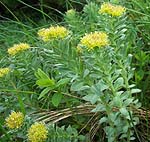| Home A B C D E F G H I J K L M N O P Q R S T U V W X Y Z |
|
Home |
Rhodiola Rosea – What it Is and What it Does
Rhodiola rosea is a plant that is native to the mountainous regions of Europe, Asia and the Arctic region. It grows in dry, cold areas and has been a staple in the diets of many Eastern European and Scandinavian countries for centuries. Not surprisingly, much of the research on this herbal supplement has been done in that part of the world. Only recently have we, in the West, become aware of the amazing properties of Rhodiola. Russian researchers have categorized this herbal as an adaptogen. An adaptogen is an endurance enhancer. It can increase the body’s responses to a variety of physical, chemical and biological stressors. Researchers tout its usefulness in warding off depression, cancer and cardiopulmonary dysfunctions. It can also be used to treat hypertension, irritability, headaches, fatigue and many other sleep disturbances. It may even be helpful in increasing thyroid function, improving memory and learning capabilities, regulating menstruation and infertility and even helping to protect one from environmental toxins. Currently, there are no known drugs or herbal interactions associated with Rhodiola; however, research is still being done on the product, especially here in the West. One should not take Rhodiola while pregnant or breast-feeding as the risks to pregnant women and nursing mothers have not been studied enough to know for certain if there is a potential hazardous interaction. Because Rhodiola is a stimulant, individuals with manic-depression (bipolar disorder) should not take this product. Irritability and insomnia are two of the more common side effects of Rhodiola. They are usually seen when more than 1,500 mg of the herbal is taken a day. Before adding a new herbal remedy or supplement to your daily routine, you should consult with a medical doctor or holistic health practitioner. Herbals have been known to interact with certain prescription drugs and may not be beneficial if you have other, related conditions. When it comes to your health, it’s always better to err on the side of caution.
Article by Deanna Couras Goodson |
|||
|
|
|||
|
Glossary References Links Contact
|